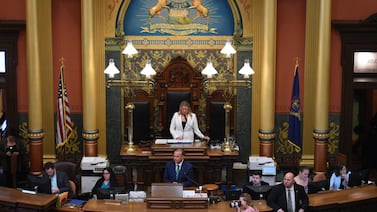Sign up for Chalkbeat Newark’s free newsletter to get the latest news about the city’s public school system delivered to your inbox.
A coalition of plaintiffs that sued New Jersey for the de facto racial and socioeconomic segregation that persists in its public school system has scored a win.
The state’s appellate court agreed this week to take on Latino Action Network v. New Jersey, a move that brings the case closer to a resolution after seven years of trudging through the court system.
The plaintiffs alleged in the suit that the state is responsible for the pervasive segregation that exists across its 600-plus school districts, entrenched in part due to a rule requiring students to enroll in their hometown school district. New Jersey’s constitution is unique in its explicit ban on school segregation.
“We’re confident the court will conclude that the trial court erred by not ruling in October 2023 that the egregious levels of racial and socioeconomic segregation that pervade New Jersey’s public schools violated plaintiffs’ constitutional rights,” said Robert Kim, one of the attorneys representing the plaintiffs and the executive director of Education Law Center.
Latino Action Network and NAACP New Jersey State Conference are among the social justice groups and families that filed the lawsuit against New Jersey in 2018. Five years later, a trial court judge issued a mixed opinion that stopped short of ordering the state to fix its segregated school system. The lengthy trial court opinion stated that the plaintiffs demonstrated persistent “racial imbalance in numerous school districts” but failed “to prove that the state’s entire educational system is unconstitutionally segregated.”
This case has been one of few nationally to address systemic racial and socioeconomic segregation in schools on a statewide level. A decision could have reverberations across the country at a time when policies to strengthen diversity, equity, and inclusion practices are under threat by the federal government.
Following the trial court’s mixed ruling in 2023, the parties entered a mediation phase that ended earlier this year after they couldn’t agree on possible remedies to the segregated school system. An agreement through mediation would have avoided years of litigation and saved taxpayer money.
In May, the state pushed back on the plaintiffs’ motion to have the higher court review the trial court opinion. The state defendants argued that there is insufficient legal record for an appellate court to review the case at this point and that it should stay at the trial court level.
A few weeks later, the plaintiffs in court documents argued that the state’s opposition to have the appeals court step in was a stalling tactic in an effort to kick the case to the next governor’s administration.
“Regrettably, the state’s apparent goal in this litigation is to continue to stall its resolution so that the issue becomes the responsibility of the next administration. But its alarming denial of responsibility, in and of itself, cries out for review,” wrote the plaintiffs’ attorneys in court documents dated June 13.
Gov. Phil Murphy, a Democrat, is serving the last year of his two-term tenure. Democratic candidate U.S. Rep. Mikie Sherrill and Republican candidate Jack Ciaterelli, a former state assemblyman, won their party’s nominations in June and will be facing off in November to succeed Murphy.
A court date had not been scheduled as of Friday.
School choice group’s brief approved to enter case
The New Jersey Policy Institute, a think tank that supports school choice, made a motion in May to enter a brief to the court record about a possible remedy the court should consider. The group wants to see an expansion of the state’s existing interdistrict school choice program as a way to create “greater diversity in New Jersey schools,” the brief stated.
The appellate court also granted that group’s motion, but noted that a merits panel will determine if and to what extent the group can participate in oral arguments, court records showed.
The voluntary interdistrict school choice program allows school districts to opt in as a “choice district,” but has been frozen since 2015 with a waitlist of more than 2,000 students, the group stated in its brief.
“By accepting NJPI’s brief, the Appellate Division acknowledges that the public interest is served by considering NJPI’s policy-based solution as a potential remedy,” said Rosemary Becchi, the group’s president and founder.
Are New Jersey’s schools segregated?
The plaintiffs’ lawsuit drew data from a 2017 UCLA Civil Rights Project study that found New Jersey ranked sixth in the nation in terms of the highest segregation of Black students and seventh in segregation of Latino students.
The suit cited enrollment data for 23 districts, including Newark, with significantly high percentages of Latino and Black students who qualified for free or reduced-price lunch. The state, the lawsuit argued, is in violation of its constitution, which is explicit in its ban on segregation.
But, the state countered, segregation in 23, or 3.41%, of the state’s 674 districts didn’t establish a statewide violation.
Despite New Jersey’s high ranking in segregation of Latino and Black students, most voters remain unaware of that data and of the lawsuit at hand, according to a Fairleigh Dickinson University Poll last year.
In a recent interview, Dan Cassino, the executive director of that polling center, said a ruling in this case ahead of the November gubernatorial election would “throw a bomb” into the race. “We’ve got candidates who are going to do their best to talk around the issue of racial segregation in schools but that issue is going to keep coming up,” Cassino previously said.
Catherine Carrera is the bureau chief for Chalkbeat Newark. Contact Catherine at ccarrera@chalkbeat.org.







